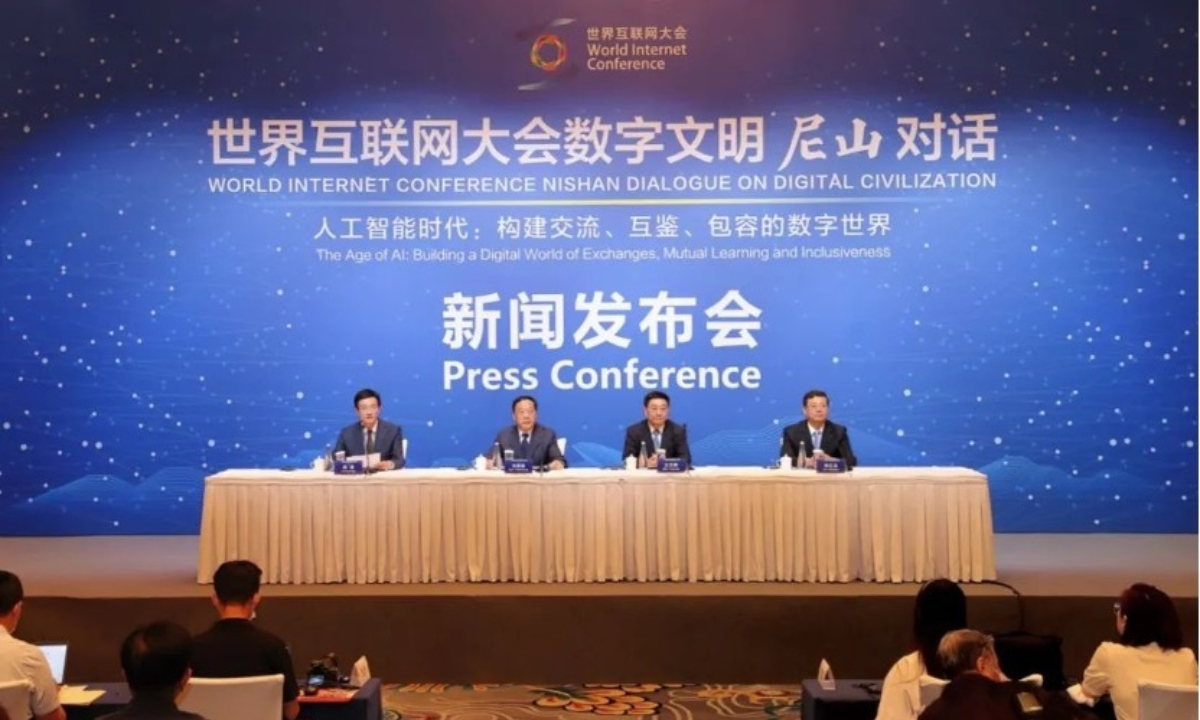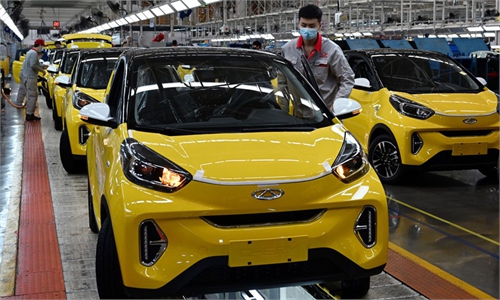International community urgently needs to refine AI ethical standards, norms and accountability mechanisms: experts

The press conference of the World Internet Conference Nishan Dialogue on Digital Civilization held in Beijing, June 16, 2023. Photo: Xu Yelu/GT
The international community urgently needs to jointly refine AI ethical standards, norms and accountability mechanisms to ensure that technology is more transparent, trustworthy, and inclusive, Chinese experts said at a press conference at the World Internet Conference Nishan Dialogue on Digital Civilization on Friday.
With the rapid development of generative artificial intelligence models, their impact on human civilization is increasing daily, and the opportunities and challenges of artificial intelligence have become two ends of a balance.
To discuss the issue, the World Internet Conference will host a digital civilization dialogue on June 25 in Nishan, East China's Shandong Province - the birthplace of Confucius - which will be aimed at exploring how AI can promote the development of human civilization, encourage all parties to better excavate the value of historical culture in the digital age, strengthen international cultural exchange and cooperation, pave new ways for the development of AI technology, and jointly promote the development and progress of human civilization.
Hundreds of high-level representatives from dozens of countries and regions around the world in government, business, academia, and research will participate in the dialogue in person or online.
The world is experiencing a significant change unseen in a century, filled with hope yet also fraught with challenges, especially as unilateralism and isolationism grow and assertions of civilization conflict and superiority sporadically surface, Ren Xianliang, deputy head of the Cyberspace Administration of China (CAC) said at the press conference in Beijing.
The importance of cultural exchange and learning from different civilizations is becoming increasingly prominent. Breakthroughs in AI technology are constantly disrupting conventional knowledge, driving the development of manufacturing, social governance, and cultural construction, while also bringing risks and challenges related to data privacy, security, and social ethics, Ren noted.
According to officials at the conference, Shandong Province has deployed the world's first deterministic network spanning 5,600 kilometers and established two national internet backbone direct connection points in Jinan and Qingdao, becoming the only province in the country with two national backbone hubs.
Choosing to hold the dialogue in Nishan reflects the collision and exchange of traditional civilization's wisdom and knowledge in the digital age, Ren said.
In 2022, the total digital economy of Shandong exceeded 3.9 trillion yuan ($550 billion), accounting for 45 percent of its gross domestic product, according to Bai Yugang, a member of the Standing Committee of the CPC Shandong Provincial Committee.
In terms of digital presentation of cultural heritage and artifact protection, more than 2.8 million artifacts have been digitized, Bai explained.
The AI industry has had a significant impact on human production and life, which is inevitable, experts said. While discussing how generative AI promotes disruptive innovation, new challenges that AI brings to social governance and even human civilization must be evaluated. For example, questions such as how to ensure that AI bridges the digital divide and avoids exacerbating global digital inequality; how to avoid the dominant culture countries using digital technology and platforms to dump a large number of cultural products, destroying global cultural diversity and richness; how to play a positive role in preventing telecom fraud and governance of false information, effectively curbing related negative impacts; controlling the application and development of AI in weapon systems, avoiding threats to strategic stability, among other challenges are all urgent issues for people to solve.
Therefore, the international community urgently needs to jointly refine AI ethical standards, norms and accountability mechanisms to ensure that technology is more transparent, trustworthy, and inclusive, experts vowed.
For AI regulation issues, firstly, enterprises should continuously improve the transparency and interpretability of AI systems, responsibly disclosing the operation mode of AI algorithms, Ren said.
Secondly, the government should implement AI ethical reviews to safeguard the fairness and justice of technology applications.
Thirdly, the role of social organizations should be played to guide all parties to consciously abide by ethical rules and improve AI ethical consciousness.
In April, the CAC issued a poll on the generative artificial intelligence service management measures for public comments, hoping to promote the healthy development of generative artificial intelligence technology and standardized application.
However, these issues being addressed at a country-level is far from enough, as artificial intelligence brings complex and intertwined global security and ethical challenges, which concern all countries and the common future of mankind and should be discussed and decided by all countries in the world, Ren said.


